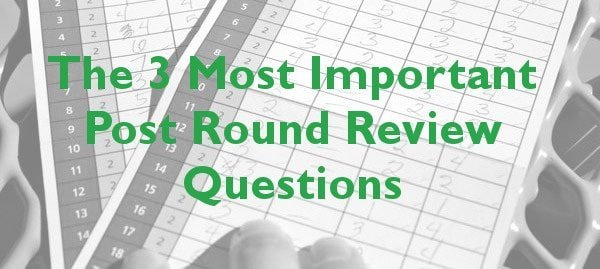
The 3 Most Important Post Round Review Questions
Whenever I talk to my students after a round, there are 3 questions that I ask them. The answers to these questions, tell me how good a round it was (it also tells me a player’s “Mental Game Score”).
What are these questions? If you did these 3 things well, you maximize your chances of success. In other words, by trying to improve your mental game score each time you play, you increase your chance of a good actual score.
Question 1: How well did you stick to your Process?
What do I mean by process and why should you “stick to it”? All my players know their recipe for success for each shot. This could be any combination of the following:
- Visualization (Mental Rehearsal)
- Physical rehearsal
- Staying committed
- A good tempo
- Alignment
- Picking a small target etc.
They score each shot based on whether they achieved their most important “process goals”. If they did, they give themselves a point on their mental game scorecard. When a student of mine scores 90% or above on their mental game scorecard, they invariably played well.
This keeps you present and focused on “the process” instead of the possible consequences of your shot. The beauty of making process your goal is that it’s completely within your control!
Question 2: How well did you stay present?
Your ability to stay present transcends golf, but it’s a skill that is required to play your best golf. Whenever a student of mine has a low round, they recall being very “present”, that is they weren’t caught up with dwelling over bad shots, or missed opportunities or trying to predict their upcoming score. They were in THE NOW, or in the present moment. Every round is an opportunity to get better at being present. When you’re in the present you’re non-judgmental, you’re not thinking about the future value of an upcoming shot to you, e.g. “if I make this putt then I’ll be on one under” or “if I can this up and down, I’ll make the cut” etc. Instead you play every shot as if it’s worth ONE shot. Because you’re in the present and not in the future, there’s no consequence to the shot. What does this do? It quietens the mind, increases focus on your “process” and lowers tension, giving you better access to your “athletic mind” during your swing. It allows you to be free with your swing or putting stroke. The result: better shots, more acceptance and lower scores.
Question 3: How well did you process negatives?
Mistakes are a part of any round of golf. There haven’t been many rounds in history where a player has hit every fairway and every green. Most of us miss several times per round.
Letting mistakes get to you is going to change your mood for the worse, and increase your chances of hitting more bad shots. I’m not sure who said it, but there’s a saying, “life is 10% what you do and 90% how you react to it”. The same applies to golf (as we know, golf is a metaphor for life in many ways).
Challenge yourself to get better at “processing negatives”. A good first step is “pre-accepting” that misses happen to the best players in the world, so when they happen, you can get over them quickly. Visualize and prepare your responses. You might have some positive self-talk which can help you get over it and back in the present moment. Have self-compassion and be your inner caddie, instead of being self-critical and over-analyzing your swing.
Calculate Your Mental Game Score
If you’d like to learn how you can improve your mental game score and increase confidence and focus during every round, please check out my Ultimate Mental Game Training System.
You can also get a free copy of my mental game scorecard (if you haven’t already got it, by clicking below.
Photo by Julie Rybardczyk


